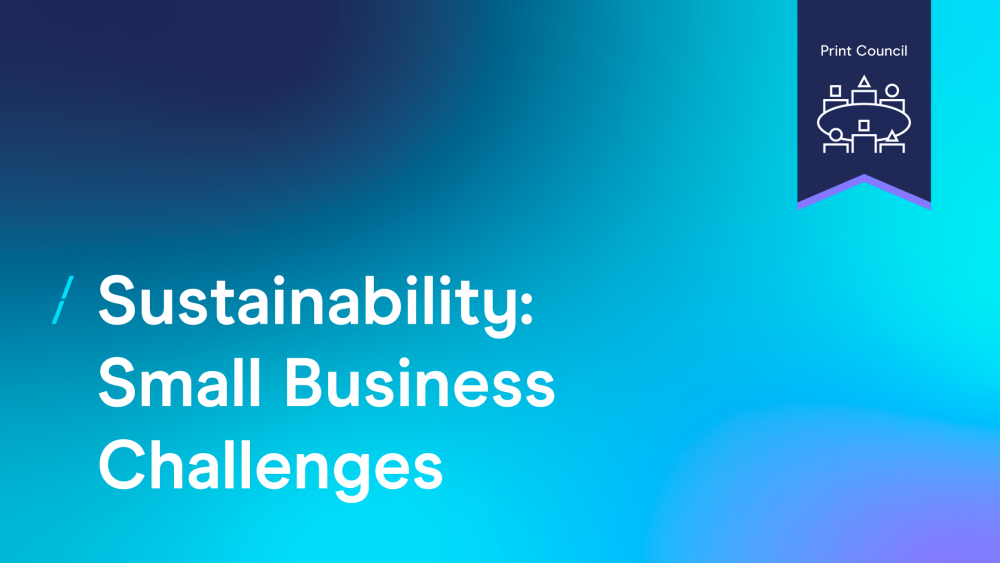The Sustainability Challenges of Small Businesses
23 Aug 2024

This article is written by Chris Rothwell, Director at The Letterbox Consultancy, and member of the Print Council’s Sustainability Hub.
Small businesses and sustainabillity: The challenges and possible solutions
If you run a business in the UK, chances are it's a small one. In fact, 99% of UK businesses are classified as SMEs (Small and Medium Enterprises), totalling an impressive 5.6 million businesses (Forbes 2023).
I work for an SME in marketing, and we produce and mail millions of print items each year. We're keen to operate sustainably, so we investigated various accreditations and carbon capture/neutral schemes. The challenge? Finding options relevant to our industry that are manageable for a company of our size.
This got me thinking about how small businesses can make meaningful contributions to sustainability without stretching their resources too thing
As a small business owner, you’re likely juggling multiple roles – sales, HR, procurement, accounting, legal, customer services, and now, sustainability manager.
Let's focus on printed materials and explore the challenges, and potential solutions.
Financial Constraints
Consider a café on the high street offering takeaway coffees. Naturally, you would want to provide customers with coffee cups that are recyclable, composable, made from sustainable materials, or all the above. However, these options are more expensive than their less sustainable counterparts, for example, when I contacted a large catering supplier, the prices were as follows:
- Regular paper cups: 2.3p each
- Recyclable cups: 3.6p each
- Compostable cups: 4.2p each
With tight margins and rising costs, this presents a significant challenge for small businesses. Ideally, customers would bring their own cups, rewarded with a discount. However, not offering disposable options could alienate more customers than it attracts. You could offer your customers a choice of cup, but is that practical? Asking every customer during a busy rush, "Would you like your Flat White in a compostable cup for an extra 5p?" could frustrate customers and slow down service.
Possible Solutions:
1. Incentivise Sustainable Behaviour: Encourage customers to bring reusable cups by offering a discount. Over time, this could reduce the number of disposable cups needed.
2. Bulk Purchasing: Negotiate better rates for sustainable products by purchasing in bulk or teaming up with other small businesses to leverage collective buying power.
3. Surcharge for Sustainability: Implement a small surcharge for compostable or recyclable cups. Be transparent with customers, showing that the extra cost supports sustainability efforts.
Limited Resources
When we set out to formalise our sustainability policies, we encountered the challenge of limited time and resources. Larger organisations have dedicated staff to manage sustainability initiatives, But 99% of companies don't have this luxury.
Possible Solutions:
1. Consultants and Experts: Hire sustainability consultants who can guide small business owners through regulations and requirements, for a reasonable fee. They can assess your business practices, create a plan, and help you implement it.
2. Incremental Gains: Focus on small, incremental changes that collectively have a significant impact. For instance, switching to energy-efficient lighting or negotiate better rates on recyclable materials. Every little helps.
Measurement – Is It All Worth It?
A challenge for small businesses is measuring whether the incremental changes have any meaningful impact - and if this is at the cost of profitability. For example, if a coffee shop switches to compostable cups, how can it determine whether this leads to more sales? While this may seem leveraging genuine sustainable practices to generate extra profit is desirable.
Small businesses often lack the standard metrics and measurement frameworks available to larger companies.
Possible Solutions:
Online Tools and Calculators: Use simple online tools to track your carbon footprint and measure the impact of your sustainability efforts. These tools are designed to be user-friendly and can provide valuable insights.
2. Carbon Offsetting: Invest in carbon offset programmes, such as tree planting initiatives or funding renewable energy projects, to neutralise your carbon footprint. This is an excellent option for businesses that find full accreditation, like B Corp, out of reach.
3. Simple Metrics: Track straightforward metrics like energy consumption, waste reduction, and cost savings from sustainable practices. This data can provide a clear picture of the benefits and effectiveness of your efforts. It's about finding what works best for your business and building on that.
Conclusion
Small businesses can make significant sustainability strides by addressing financial constraints, managing limited resources, and effectively measuring their impact. By starting with small, manageable changes and leveraging available tools and expertise, SMEs can contribute meaningfully to a more sustainable future while maintaining profitability.
Making sustainability part of your business ethos is crucial. Every small step count, and collectively, we can make a substantial difference.
If you're interested in joining the DMA Print Council and it's sustainability hub, please fill in our Council Application Form, or contact the team for more information: Councils@dma.org.uk
Please login to comment.
Comments